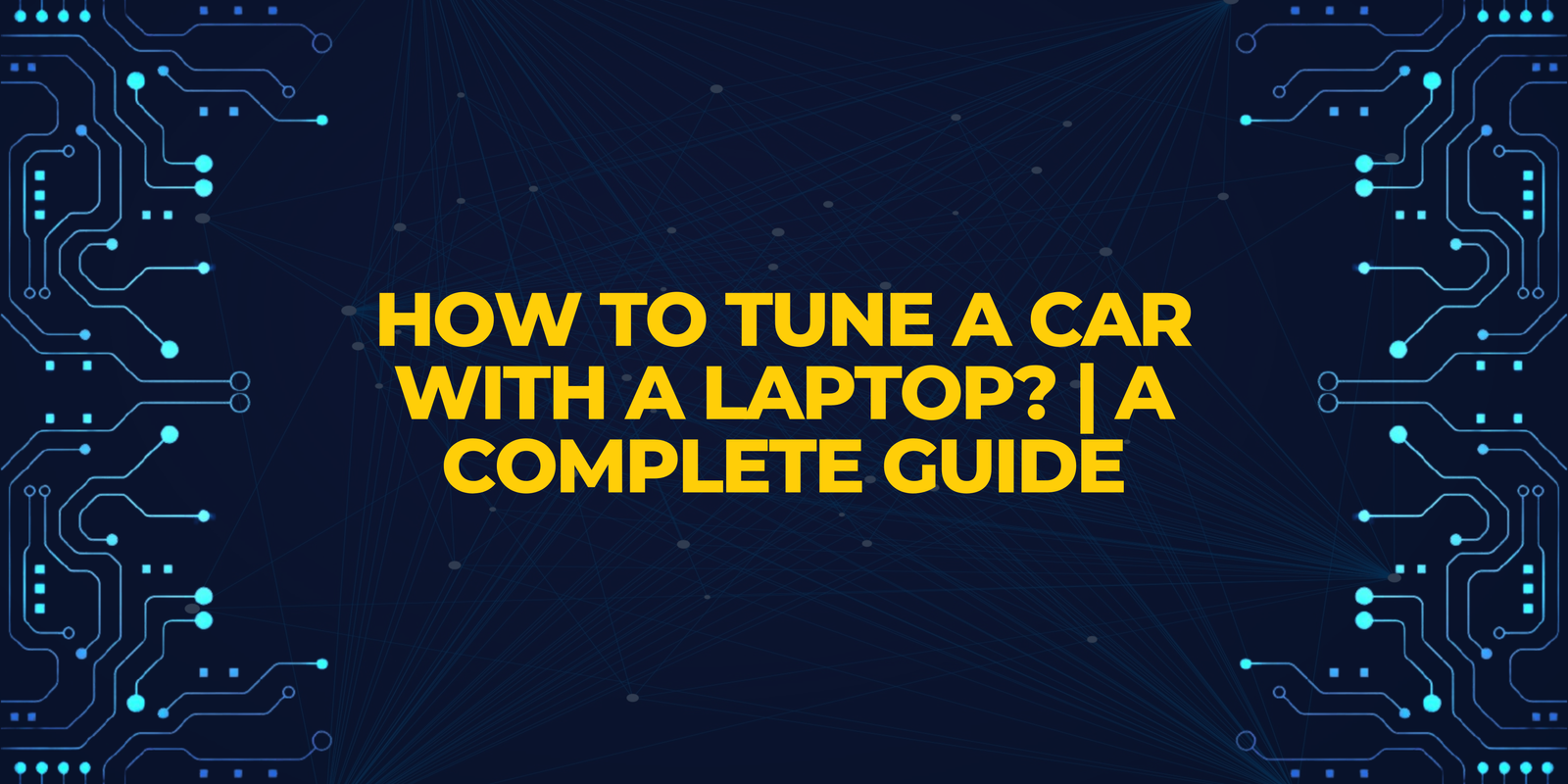How To Tune A Car With A Laptop? – Know It All
Tuning a car has become easier and more accessible with modern technology. Now, you can Tune A Car With A Laptop, making changes to your vehicle’s performance from the comfort of your garage. This method lets you adjust engine settings, improving things like horsepower and fuel efficiency. With the right software, your laptop becomes a powerful tool for car tuning that allows you to make precise adjustments.
Using a laptop for car tuning means you can personalize your car’s performance. You can tweak settings to get better throttle response or optimize fuel usage. This article will provide you with information on how to use your laptop to make these changes, ensuring your car runs at its best. Let’s learn how to Tune A Car With A Laptop and unlock your vehicle’s full potential.
How To Tune A Car With A Laptop?
The following are the main steps to tune a car with a laptop:
1. Gather Necessary Tools:
Laptop:
Ensure it meets the specifications required by your tuning software.
OBD2 Cable:
This connects your laptop to the car’s ECU.
Tuning Software:
Popular options include TunerPro, MegaSquirt, and TOAD Pro. Ensure the software is compatible with your car’s make and model.
2. Preparation:
Check Vehicle Condition:
Ensure your car is in good working condition to avoid issues during tuning.
Find a Stable Work Environment:
Work in a flat, safe area to prevent any accidents.
3. Install Software:
Download and install the tuning software on your laptop. Familiarize yourself with its interface and features.
4. Connect to ECU:
Plug the OBD2 cable into your car’s OBD2 port usually under the dashboard and connect the other end to your laptop.
5. Read and Modify ECU Settings:
Launch the software and select the option to read your car’s ECU. This will display the current parameters like fuel injection timing, air/fuel ratio, and spark timing.
Make the desired adjustments based on your tuning goals. For instance, to increase horsepower, adjust the air/fuel ratio and ignition timing. For better fuel efficiency, modify throttle response and idle speed.
6. Test and Refine:
After making changes, test drive your car to see the effects of the adjustments. Use a dynamometer for precise measurements if available. Refine the parameters until you achieve the desired performance.
What Is ECU Tuning
ECU stands for Engine Control Unit. It is your car’s computer brain. ECU tuning involves modifying the software program to optimize engine performance. This can be done through remapping or using tuning boxes.
Different Types Of ECU Tuning
The following are several types of ECU tuning:
1. Chip Tuning:
This involves replacing or reprogramming the chip in the ECU with new software to adjust the engine’s performance settings.
2. Remapping:
This is rewriting the ECU’s software to change the engine’s behavior and improve performance or efficiency.
3. Piggyback Systems:
These additional modules work alongside the existing ECU to modify its signals and enhance performance without altering the stock ECU.
4. Standalone ECUs:
These replace the factory ECU entirely and offer complete control over the engine’s parameters, suitable for highly customized or racing vehicles.
Is ECU Remapping Worth It?
ECU remapping can be worthwhile depending on your goals and vehicle modifications. The benefits include increased horsepower and torque, better throttle response, improved fuel efficiency, and enhanced driving experience.
However, it is important to consider potential downsides such as voiding manufacturer warranties, the legality of modifications depending on local emissions regulations, and the risk of engine damage if not done properly. If done by a reputable tuner and by vehicle specifications, ECU remapping can significantly improve performance and is often considered a valuable investment by enthusiasts.
When And Why To Upgrade Your ECU
Upgrading your ECU can provide significant benefits, particularly if you’re looking to enhance your vehicle’s performance. The primary reasons to consider an ECU upgrade include:
1. Increased Performance:
Upgrading your ECU can boost engine power and torque. This is particularly beneficial for high-performance vehicles or those used in competitive driving.
2. Fuel Efficiency:
Some ECU upgrades can optimize fuel consumption, which is advantageous for daily driving and long-distance travel. This is achieved by adjusting the air-fuel ratio to make the engine run more efficiently.
3. Improved Throttle Response:
An ECU upgrade can enhance throttle response, making your vehicle more responsive to driver inputs. This results in smoother acceleration and a more engaging driving experience.
4. Customization:
ECU upgrades allow for customization based on driving needs. Whether you need more power for racing or better fuel efficiency for commuting, the ECU can be tuned to meet these specific requirements.
When to Upgrade Your ECU
The timing for an ECU upgrade depends on various factors, including your vehicle’s current performance, your driving habits, and your specific needs. Generally, you should consider an upgrade if:
Your vehicle feels sluggish or unresponsive: An upgraded ECU can revitalize your vehicle’s performance.
You’ve made other performance modifications: If you’ve installed a new exhaust, intake, or turbocharger, an ECU upgrade can help maximize these modifications.
You participate in motorsports or track days: For competitive driving, an ECU upgrade can provide the edge needed for better lap times and overall performance.
How Do Car Tuners Work?
Car tuners modify a vehicle’s engine control unit to optimize performance, improve fuel efficiency, or customize driving characteristics. The ECU is the computer that controls engine functions such as ignition timing, air/fuel ratio, and boost pressure. Here’s how car tuners work:
1. Ignition Timing:
Adjusting when the spark plug fires during the engine cycle can significantly impact power and efficiency. Advancing the timing can improve performance but it requires careful tuning to avoid engine knock which can cause damage.
2. Air/Fuel Ratio:
Tuning the air or fuel mixture ensures optimal combustion. A richer mixture or more fuel can produce more power, while a leaner mixture improves fuel efficiency. The ideal ratio depends on the engine and its components.
3. Boost Pressure:
For turbocharged or supercharged engines, increasing the boost pressure allows more air to enter the engine, which can be mixed with more fuel to produce greater power. This modification requires reinforced engine components to handle the added stress.
4. Pre-Loaded Tunes:
Many tuners come with pre-loaded tunes that are designed for specific performance goals, such as increased horsepower or improved fuel economy. These tunes are often developed by professionals and tested for reliability and performance.
Comparison Of Traditional Vs Computerized Car Tuning
Traditional Car Tuning | Computerized Car Tuning |
Basic mechanical tools are required | Laptop, tuning software, OBD-II interface |
Relatively low precision | High precision with fine-tuned parameters |
Time-consuming | Faster adjustments and updates |
Limited to physical modifications | Extensive customization through software |
Typically lower upfront costs | The higher initial cost for software and hardware |
Requires mechanical expertise | Requires computer and software knowledge |
Limited feedback during adjustments | Real-time data and diagnostics |
Harder to update and maintain | Easier to update and maintain software settings |
FAQs
Can I Tune My Car?
Yes, you can tune your car. Many enthusiasts and professionals use tuning to optimize vehicle performance, enhance fuel efficiency, and personalize driving characteristics. With the right tools, such as a laptop, tuning software, and an OBD-II interface, you can make adjustments to your car’s engine control unit to achieve your desired performance goals.
Does Tuning A Car Increase Hp?
Yes, tuning a car can increase horsepower (HP). By adjusting the engine’s parameters, such as air/fuel ratio, ignition timing, and boost pressure, tuning can significantly enhance the engine’s output. However, the actual increase in horsepower depends on the specific modifications and the vehicle’s original performance capabilities.
What Is Stage 1 Tuning?
Stage 1 tuning is the initial level of performance enhancement for a vehicle’s ECU. It typically involves software modifications without requiring any physical changes to the car’s hardware. Stage 1 tuning is designed to optimize the engine’s parameters within safe limits set by the manufacturer, providing a noticeable increase in power and efficiency while maintaining reliability.


Leave a Reply